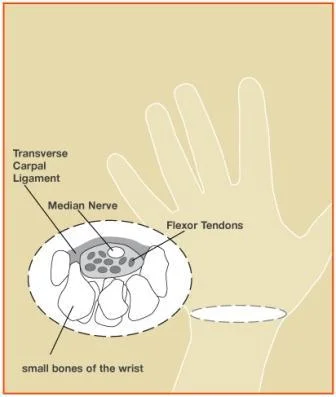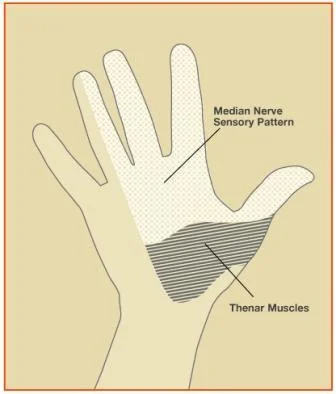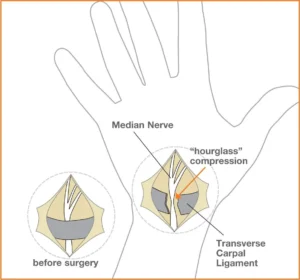Hand Pain / Carpal Tunnel
Carpal tunnel syndrome (CTS) is a condition brought on by increased pressure on the median nerve at the wrist.
In effect, it is a pinched nerve at the wrist. Symptoms may include numbness, tingling, and pain in the arm, hand, and fingers. There is a space in the wrist called the carpal tunnel where the median nerve and nine tendons pass from the forearm into the hand.
Carpal tunnel syndrome happens when pressure builds up from swelling in this tunnel and puts pressure on the nerve. When the pressure from the swelling becomes great enough to disturb the way the nerve works, numbness, tingling, and pain may be felt in the hand and fingers.
Usually, the cause is unknown. Pressure on the nerve can happenin several ways: swelling of the lining of the flexor tendons, called tenosynovitis; joint dislocations, fractures, and arthritis can narrow the tunnel; and keeping the wrist bent for long periods of time. Fluid retention during pregnancy can cause swelling in the tunnel and symptoms of carpal tunnel syndrome, which often go away after delivery. Thyroid conditions, rheumatoid arthritis, and diabetes also can be associated with carpal tunnel syndrome. There may be a combination of causes.


The carpal tunnel is found at the base of the palm. It is formed by the bones of the wrist and the transverse carpal ligament. Increased pressure in the tunnel affects the function of the median nerve.
Carpal tunnel syndrome symptoms usually include pain, numbness, tingling, or a combination of the three. The numbness or tingling most often takes place in the thumb, index, middle, and ring fingers. The symptoms usually are felt during the night but also may be noticed during daily activities such as driving or reading a newspaper. Patients may sometimes notice a weaker grip, occasional clumsiness, and a tendency to drop things. In severe cases, sensation may be permanently lost and the muscles at the base of the thumb slowly shrink (thenar atrophy), causing difficulty with pinch.
(Although carpal tunnel is commonly found as an isolated condition, it can frequently co-exist with other compressed or pinched nerves. These can be in the wrist arm or neck regions. For example, if you have numbness in the small finger as well, the Ulnar nerve needs to be checked. Nerves are like long wires coming off the spine and can be pinched at more than one site along their path. Comprehensive evaluation by a peripheral nerve surgeon is ideal for these conditions. See section on peripheral nerve decompression)
A detailed history including medical conditions, how the hands have been used, and whether there were any prior injuries is important. An x-ray may be taken to check for the other causes of the complaints such as arthritis or a fracture. In some cases, laboratory tests may be done if there is a suspected medical condition that is associated with CTS. Electrodiagnostic studies (NCV–nerve conduction velocities and EMG–electromyogram) may be done to confirm the diagnosis of carpal tunnel syndrome as well as to check for other possible nerve problems.
(It is very important to understand that the electrodiagnostic studies are not always needed to confirm the diagnosis of carpal tunnel syndrome. This is a diagnostic study that should be utilized only if necessary. Further, like other diagnostic tests it has it own rate of false negative and false positive results. The whole clinical picture should be considered in diagnosing nerve compression syndromes, “pinched nerves”, like carpal tunnel)
Symptoms may often be relieved without surgery. Identifying and treating medical conditions, changing the patterns of hand use, or keeping the wrist splinted in a straight position may help reduce pressure on the nerve. Wearing wrist splints at night may relieve the symptoms that interfere with sleep. A steroid injection into the carpal tunnel may help relieve the symptoms by reducing swelling around the nerve.
When symptoms are severe or do not improve, surgery may be needed to make more room for the nerve. Pressure on the nerve is decreased by cutting the ligament that forms the roof (top) of the tunnel on the palm side of the hand (See the Figure) . Incisions for this surgery may vary, but the goal is the same: to enlarge the tunnel and decrease pressure on the nerve.

Following surgery, soreness around the incision may last for several weeks or months. The numbness and tingling may disappear quickly or slowly. It may take several months for strength in the hand and wrist to return to normal. Carpal tunnel symptoms may not completely go away after surgery, especially in severe cases.
Nerve Surgery Helps Relieve Chronic Pain
The majority of patients with chronic pain report significant decreases or complete resolution of their pain following nerve surgery. Most patients describe the ‘nerve pain feelings’ are improved as soon as the following day. Discomfort from the operation is frequently described as a completely different sensation, which subsides in the next few weeks.